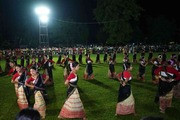Detailed Narrative
Traditionally observed during the month of Chot (March-April), this festival features mesmerizing Bihu songs, rhythmic drum beats (Dhol), and indigenous dances performed under the open night sky. Men and women in traditional Moran attire gather around large bonfires, where stories, songs, and rituals are exchanged as a tribute to their forebears and agrarian way of life.
The highlight of Moran Rati Bihu is its raw and rustic authenticity-it remains untouched by commercialization, retaining the charm of age-old customs. Participants use local instruments like Pepa, Gogona, and Taal, while the younger generation is taught the cultural significance of every dance step and lyrical verse.
In recent years, Moran Rati Bihu has gained attention for its contribution to Assamese tribal heritage. Cultural researchers and tourists alike are showing interest in witnessing this rare and soulful celebration. By promoting Moran Rati Bihu, we not only preserve a tradition but also celebrate the diversity and unity of Assam's vibrant culture.
Origins and Cultural Significance
Historically, Rati Bihu was an opportunity for young men and women to meet, interact, and express romantic interest - something rarely allowed in conservative Assamese society. These gatherings were not only cultural but also social, giving space for matchmaking and playful courtship through Bihu songs (Bihu geet) and dance.
Sung in the distinctive rhythm of traditional instruments like the dhol, pepa, gogona, and toka, the songs often carried teasing, romantic, or humorous tones, full of double meanings and folklore-inspired metaphors. This practice preserved oral literature and passed on generational folk knowledge in an entertaining way.
Why Rati Bihu Matters?
In a time when regional cultures are fading under global influences, Rati Bihu stands as a beautiful reminder of how tradition and youth can harmonize. It champions emotional expression, gender interaction, and folk creativity - all within the framework of Assamese identity.
Rati Bihu is more than just a festival - it’s a poetic celebration of life, love, and community spirit. Its songs carry stories, its dances reflect emotion, and its existence echoes a time when moonlight and melody brought hearts together.
As Assam modernizes, preserving Rati Bihu becomes crucial - not just as a ritual, but as a living expression of Assamese soul and tradition.
